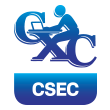e-Learning
e-Learning utilizes electronic technologies to give access to educational curriculum outside of a traditional classroom. The methodology will add value to CXC®’s product and service offerings by:
• increasing flexibility, accessibility and allow for personalization of learning to serve a more digitally advanced population;
• providing equal and equitable access to high quality learning support resources to support implementation of CXC® products and increase access to a population that is currently underserved by the Council; and,
• offering networked learning to develop and maintain connections among Caribbean learners for information sharing and communication to support research and development.
The establishment of an e-QBank to expand its e-authoring capabilities including the design and execution of technologically enhanced items with specific focus on innovative items that allow real-time interactions and feedback.
The Item Authoring and Banking system is used to develop and store the items and all associated meta-data used on certification assessments.
Candidates from government schools as well as those at private institutions are registered for Caribbean Examination Council (CXC®) examinations. Local Registrars, through an approved Centre, typically prepare the registration on behalf of the candidate. Examination and other related fees are submitted to the associated Government departments. Fees due are subsequently transferred to CXC® after the funds have been processed in accordance with Government fiscal and monetary policies and procedures. Currently, candidates are registered by a variety of means. However, the main method for registration is the Online Registration System (ORS). This is used to capture candidate details for CXC suite offerings (CCSLC®, CSEC®, CPEA™ and CAPE® along with some contracted examinations). CVQ* and National Examinations utilize bespoke registration solutions.
The Council for Curriculum, Examinations and Assessment (CCEA) describes e-testing as a test that replicates or replaces paper-based tests with a computer screen.
e-Testing enables the use of technologies that could not be easily replicated on paper. These include; videos, audio clips, hyperlinks, animation, interactive quizzes and the use of ICT interactivity. These tools combine to make assessment design and implementation more efficient, timely and consistent with current international testing modalities. CXC®’s medium to long term plan is facilitate electronic assessments across all suite of examinations. Expansion of the e-Testing capabilities to reduce/eliminate the manual intervention now required.
e-Marking is the process by which completed examination papers are scanned and retrieved into an online environment suitable for their retrieval, marking and storage. The continued capability to Auto-score multiple choice items to facilitate marking for native digital items.
Markers will use the designated digital tools to apply an appropriate mark to items, referred to as Question Item Groups (QIGs). Markers in the CXC® system are selected to mark a QIG or number of QIGs and carry out their assignment using a computer or compatible device in their own private space as opposed to being assembled in a central location by CXC®.
Candidate scores are loaded in batches into the Examination Processing System (EPS) – this system is used to convert question level raw scores to aggregate candidate scores that can be used to assign a grade. Currently, EDPD officers are required to manually enter Edit Keys in the EPS system. These parameters are used to define the profile make up of each test. Manual entry of this information is prone to error and is inherently inefficient.
The end goal of the assessments offered by the Council is to issue credible certification of a candidate’s competence in an area of study or practice. The output from the grading process is certification. Currently certification for all CXC® assessments are paper based with transcripts transferred to e-Transcript in 2020. In addition to these two e-results components, CXC® is also seeking to provide a facility to enable employers, learning institutes and other entities to validate the authenticity of the certification offered. CXC® will move to delivery of certification on a block chain platform. Delivering certificates via the block chain will allow candidates to credibly demonstrate their level of certification via electronic means.













